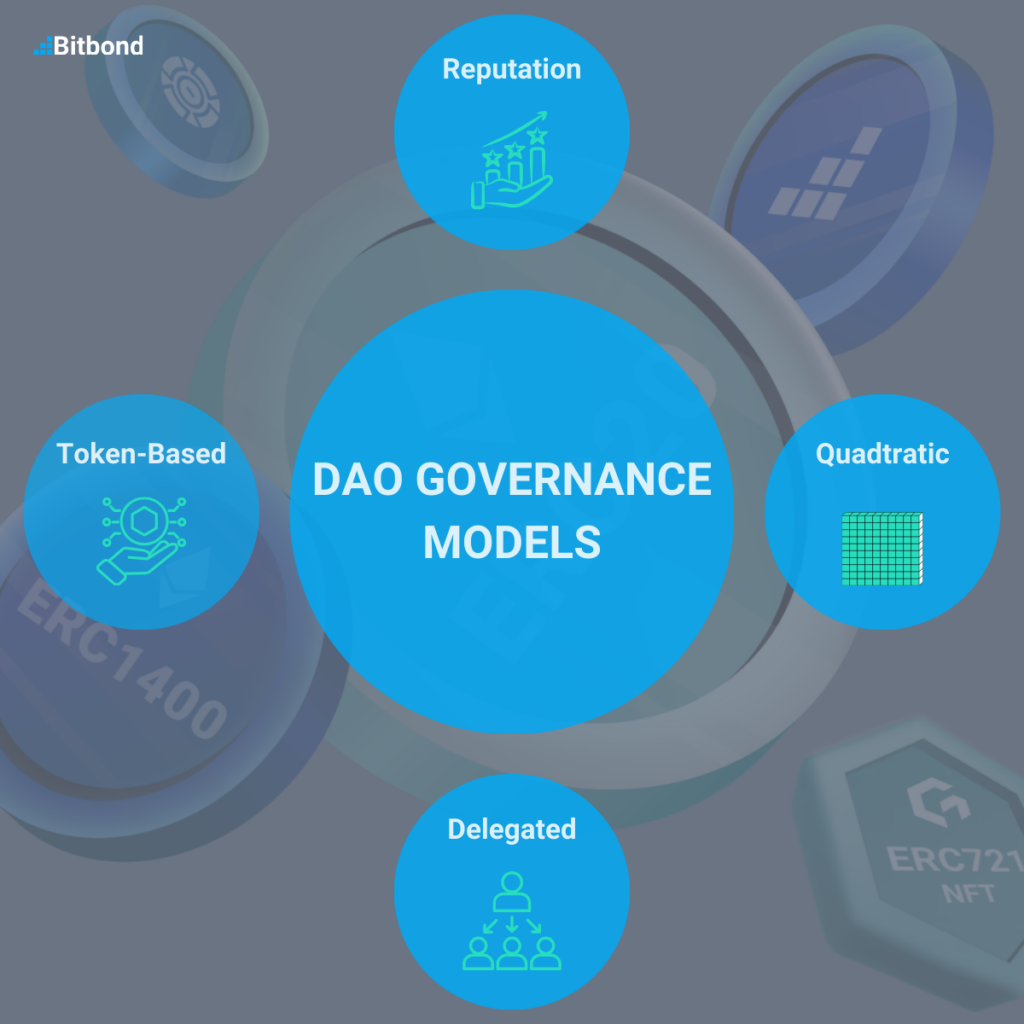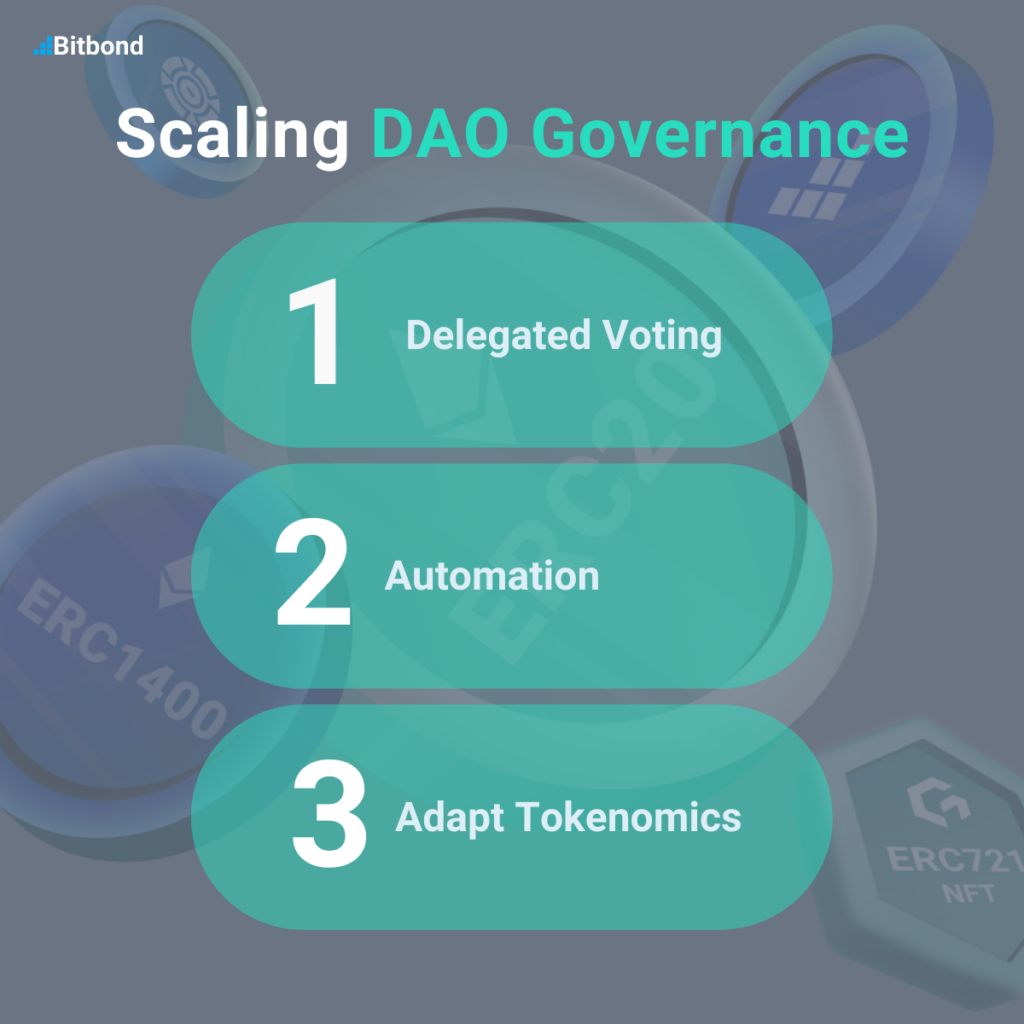As Decentralized Autonomous Organizations (DAOs) become more prevalent in the blockchain space, governance has emerged as one of the most critical aspects of managing these organizations. DAO governance ensures that decisions are made in a transparent, decentralized, and community-driven manner, empowering members to shape the future of the organization.
In this guide, we’ll explore the key principles of DAO governance, the role of governance tokens in enabling decentralized voting, and how to leverage the right tools like Snapshot, Tally, and Aragon to create a governance system that works for your DAO.
DAO governance refers to the rules, processes, and tools that determine how decisions are made within a decentralized organization. Unlike traditional organizations with centralized leadership, DAOs distribute decision-making power among token holders, who vote on key issues such as protocol upgrades, fund allocation, and strategic initiatives.
Key features of effective DAO governance include:
- Decentralization: Power is distributed among participants rather than being concentrated in a central authority.
- Transparency: All decisions, voting outcomes, and proposals are public and accessible to the entire community.
- Participation: DAO members are encouraged to actively participate in governance, either directly or through delegated voting.
Governance tokens serve as the mechanism through which voting power is distributed. The number of governance tokens a member holds typically correlates with their influence in the decision-making process.
DAO Governance Models
There are several governance models that DAOs can adopt, depending on the goals and size of the organization. Each model has its strengths and weaknesses, and it’s crucial to choose the one that aligns with your DAO’s mission:
1. Token-Based Voting
In token-based governance, voting power is directly proportional to the number of governance tokens held. This is the simplest model, where more tokens equal more influence. While this promotes participation, it can lead to centralization if a small group of token holders amasses significant control.
2. Quadratic Voting
Quadratic voting addresses the problem of token whales having disproportionate power by making each additional vote cost more tokens. This model ensures that while large holders still have a voice, the collective power of smaller token holders is not overshadowed.
3. Delegated Voting
Delegated governance allows token holders to delegate their voting power to trusted representatives. This model is useful in large DAOs where not all members have the time or expertise to vote on every issue. It also helps streamline decision-making by concentrating votes among informed delegates.
4. Reputation-Based Governance
Some DAOs opt for reputation-based governance, where voting power is based on a member’s contributions or reputation rather than the number of tokens they hold. This model encourages merit-based participation, but it can be harder to implement and track.

For more detailed insights on these models, check out CoinTelegraph’s article on DAO governance models.
Governance Tokens: A Key Component of DAO Governance
Governance tokens are the backbone of DAO governance. They represent the voting rights and influence that members hold within a DAO. Governance tokens are distributed to members based on their contributions, investments, or participation in the DAO’s activities.
Key functions of governance tokens:
- Voting Power: Governance tokens give holders the ability to vote on proposals and shape the DAO’s future. Typically, one token equals one vote, though this can vary depending on the governance model.
- Incentivizing Participation: Governance tokens also serve as an incentive for active participation, encouraging members to vote on proposals and engage in governance.
- Transparency and Security: Since governance tokens are based on blockchain technology, all voting and decisions made using these tokens are transparent and immutable, ensuring that the governance process is secure.
To create governance tokens easily and without coding, Token Tool by Bitbond offers a no-code platform that allows DAOs to issue customizable tokens that can be integrated with various governance tools.
DAO Governance Tools: Managing Decentralized Decision-Making
Once you’ve set up your governance tokens, the next step is to integrate them into a governance platform that allows your DAO members to vote on proposals, create initiatives, and make decisions. Here are some of the most popular governance tools used by DAOs:
Snapshot – Off-Chain Voting
Snapshot is one of the most widely used off-chain voting platforms for DAOs. Snapshot allows DAOs to manage governance without incurring gas fees, making it cost-effective for regular voting and proposal creation.
Key Features of Snapshot:
- Off-Chain Voting: Voting takes place off-chain, avoiding the high gas fees associated with on-chain governance.
- Proposal Management: DAO members can create and manage proposals, which are voted on using governance tokens.
- Token Integration: Governance tokens created using Token Tool can be seamlessly integrated into Snapshot for voting.
Snapshot is ideal for DAOs looking to conduct frequent votes without the expense of on-chain transactions.
Tally – On-Chain Governance
Tally offers on-chain governance, meaning that every vote is recorded on the blockchain for full transparency. This ensures that every decision is immutable and verifiable, making it the go-to choice for DAOs that prioritize security and accountability.
Benefits of Tally:
- On-Chain Transparency: All votes and decisions are recorded on the blockchain, ensuring they cannot be tampered with.
- Token-Based Voting: Governance tokens are used for on-chain voting, with each vote weighted based on the number of tokens held.
- Security: Tally’s on-chain model ensures that governance decisions are fully decentralized and resistant to manipulation.
Tally is best suited for DAOs managing large treasuries or critical governance decisions where full transparency is essential.
Aragon – Full-Stack DAO Management
Aragon is a comprehensive platform that provides a wide range of tools for DAO governance, finance, and legal management. It supports both on-chain and off-chain voting and offers more complex governance models like delegated voting.
Why Use Aragon for DAO Governance:
- Modular Governance: Aragon allows DAOs to design custom governance frameworks based on their needs.
- Delegated Voting: Supports delegated voting, where token holders can assign their voting power to trusted representatives.
- Treasury Management: In addition to governance, Aragon includes financial management tools for managing DAO funds and assets.
Aragon is ideal for DAOs that need a complete governance, finance, and legal management solution.
Best Practices for Effective DAO Governance
When implementing DAO governance, there are several best practices to follow to ensure the process is fair, transparent, and scalable:
- Fair Token Distribution: Ensure that governance tokens are distributed equitably to avoid concentration of power. A fair distribution will help maintain the decentralized nature of your DAO.
- Clear Voting Rules: Set clear rules for voting, such as the quorum required for a decision to pass, and the majority threshold for approval. This ensures that decisions are made in a way that reflects the will of the majority.
- Incentivize Participation: Encourage members to participate in governance by offering incentives such as additional tokens, rewards, or recognition. Active participation is key to keeping your DAO decentralized and community-driven.
- Use a Hybrid Governance Model: Consider combining on-chain and off-chain governance models to balance security and cost-efficiency. For example, you can use Snapshot for low-stakes votes and Tally for important, high-stakes decisions that require on-chain verification.
- Transparency: Ensure that all proposals, votes, and results are public and accessible to all DAO members. Transparency builds trust and accountability within the community.
Scaling DAO Governance
As your DAO grows, governance becomes more complex. Here’s how to scale your governance effectively:
- Delegated Voting: As your community expands, allow token holders to delegate their voting power to trusted representatives. This simplifies the voting process and ensures that decisions are still made efficiently.
- Automation: Use governance automation tools like DAO Base to streamline proposal management and voting. Automation reduces the administrative workload and allows for more efficient governance.
- Adapt Tokenomics: As your DAO scales, consider adjusting the tokenomics of your governance token. Implement vesting schedules, staking mechanisms, or rewards to incentivize long-term participation and commitment.

Scaling DAO governance is essential to maintaining the efficiency and decentralization of your organization as it grows in size and complexity.
Conclusion
Effective DAO governance is crucial for the success of any decentralized organization. By using governance tokens and the right governance tools, you can create a transparent, decentralized, and community-driven decision-making process. Token Tool offers an easy way to create governance tokens, while platforms like Snapshot, Tally, and Aragon help manage governance in a way that aligns with your DAO’s goals.
By following best practices such as fair token distribution, incentivizing participation, and ensuring transparency, you can ensure that your DAO remains decentralized and responsive to the needs of its members. Ready to implement DAO governance? Start by creating your governance token with Token Tool and unlock the potential